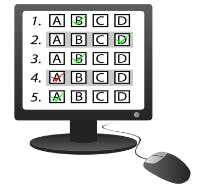Board exams: 3 not-so-obvious mistakes that dental hygiene test-takers make
Marcy was a top student in her program. Nobody had ever imagined that she would fail the dental hygiene boards.
I would like to share some of the mistakes I have repeatedly seen with those who failed. Don’t worry. I am not trying to put those students down, as they all kindly let me share their struggles. Let’s try to achieve the opposite, turning them into success stories.
Many times, the problem is not the lack of knowledge. How do I know this? When I get on a virtual call with those who discovered StudentRDH after failing the boards, the logic they have with each test question I give them is very good. With this article, let’s dive into some not-so-obvious causes behind a student’s failure at the dental hygiene boards.
1. Relying on printed materials for exam preparation
We generally like using books and printed lectures. There is something rewarding about flipping pages, highlighting areas, and making notes. I am in that category, too, even though I am the founder of an exam prep course that is 100% online (StudentRDH.com).
“It is scientifically proven
that computer screens
easily fatigue our eyes.”
The dental hygiene boards (NBDHE, NDHCE, CSCE, WREB) are administered only as electronic versions. If you skip the computer practices, you are significantly lowering your chances of passing the exams. Here is an analogy: driving your car versus participating in a virtual reality car racing game. Even though the principles of driving are the same, the sudden change of format can throw you off.
Solution: Get in the habit of using a computer screen to study and practice. Give your eyes and brain the proper training.
2. Speeding through the exam
If you ask former students how much time they had left to finish the national boards (NBDHE, NDHCE), they would most likely tell you: “A lot.” For the NBDHE (US exams), the average test-taking time seems to be three to four hours out of the eight to nine hours given. So that is fast.
“Rushing through questions in the exam
is like building a car while skipping
through some lines of instructions.”
We all have the natural tendency to rush through the exam, being concerned about not finishing on time. As a result, our eyes skip critical words. Let’s review this example.
Q: In total, how many chromosomes are there in a normal human nucleus?
A. 23
B. 46
C. 48
D. 56
In humans, each cell contains 23 pairs of chromosomes for a total of 46; 22 of these pairs are the same for both males and females. The 23rd pair, the sex chromosomes, differ between males and females.
The keywords in this question are “total” and “normal.” But I have seen many students choose (A). 23 because that is the number of “pairs.” In a calm environment, the student may have answered correctly. But when the mind is anxious, the chance of making mistakes increases by a lot. The correct answer is (B). 46.
Rushing through questions in the exam is like building a car while skipping through some lines of instructions. You can probably imagine the consequence of such problem.
Solution: Slow down. Read every word. The idea is to have precision. Do not sacrifice the details; the clues can be anywhere.
3. Getting caught in the “next-in-line effect”
Let’s say you are about to give a presentation on oral cancer in 10 minutes. You probably will not be able to pay attention to the other classmate who is presenting right now. Even after your presentation, you will still be “stuck” in your own performance. The “next-in-line effect” phenomenon is defined as impaired memory about what other people said because they were too busy rehearsing their own part.
How is this relevant to the dental hygiene boards (NBDHE, NDHCE, CDCA, WREB, CRDTS)? Let me explain. Question #10 was challenging and you were not sure about the answer. When you move on to question #11, your mind can still be caught up with question #10. This happens to us all the time. The danger here is that you are not fully paying attention to question #11, and you are at risk of misinterpreting the words and choosing the wrong answer.
“The idea is to master your mind
and maximize your performance.”
Solution: Focus on the question in front of you and let go of the past (questions). You will have a chance to get back to them later.
The idea is to master your mind. The dental hygiene boards are very difficult exams! But don’t let a small bump on the road ruin the rest of your day. Regain control, fast.
In the dental hygiene boards, a few questions can tip your results toward either fail or pass. The objective here is to understand the “not-so-obvious” hurdles you may need to overcome. Special thanks to students who allowed me to share their experiences. We all strive for the same “pass” results. I wish you the best in everything you do. Let’s achieve #SUCCESSandNOTHINGless.
Claire Jeong is an entrepreneur who is striving to promote success through education. She founded StudentRDH, which offers review courses for board examinations for dental hygiene students. The online platform delivers content of the highest quality through the latest e-learning technology. According to some students, studying is now “addicting.” Claire has a master’s degree in administration from Boston University and a dental hygiene degree from Forsyth School of Dental Hygiene in Boston. Prior to her career in the dental field, Claire Jeong was an education specialist at Boston Children’s Museum. Claire is licensed to practice in the United States as well as Canada. She also advocates for efficacy in learning and in life through her articles, speeches, and business. More test-taking techniques are on StudentRDH blogs. She can be contacted at [email protected].








